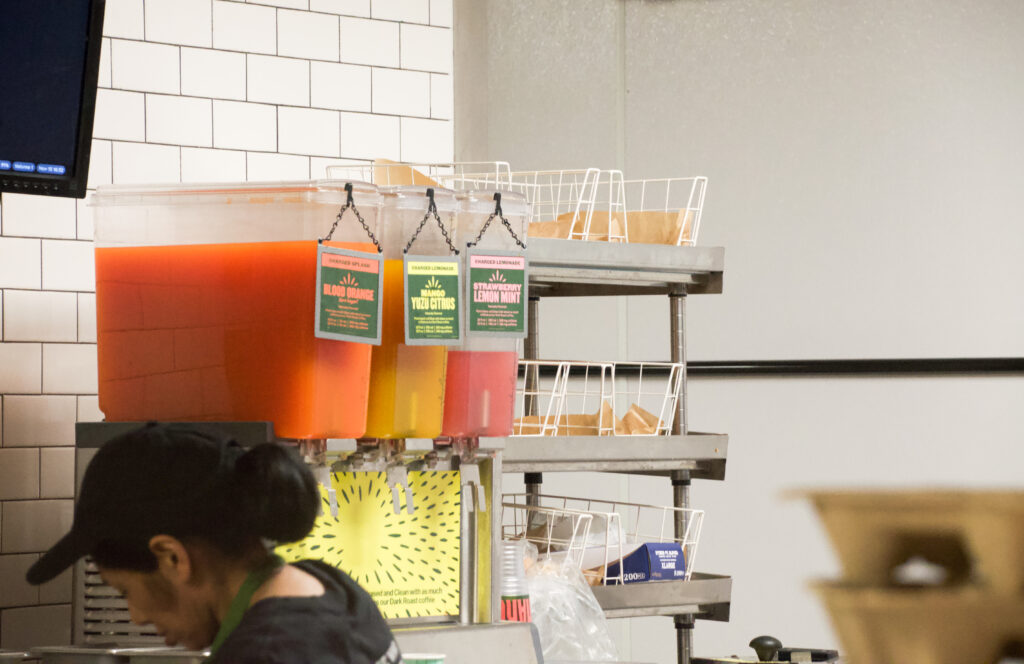Students left frustrated after Panera Bread removes self-service option for Charged Lemonades following lawsuit
5 min read
The Charged lemonade is moved from the main dining area to the kitchen. | Abbey Magnet, The Weekly Ringer
by CALLIE HARKINS
Associate Editor
The Panera Bread located on the University of Mary Washington campus has issued new warnings and removed the self-service option for the highly caffeinated Charged Lemonades, following guidance from the restaurant chain’s corporate office. These changes follow a wrongful-death lawsuit involving the beverages that was filed on Oct. 23, according to the New York Times.
Panera encouraged increased caution when consuming the Charged Lemonades after the parents of a 21-year-old University of Pennsylvania student filed a wrongful-death lawsuit that asserts that the Charged Lemonade contributed to their daughter’s death. The student, who suffered from a heart condition, passed away in Sept. 2022, the New York Times reported.
According to a UMW Panera employee who spoke on the condition of anonymity to avoid potential retaliation from their supervisors, the Charged Lemonades were moved from the main dining area to the kitchen approximately three weeks after the lawsuit was filed. The delay in their relocation was a result of limited kitchen space, as the area needed to be rearranged to accommodate the beverage dispensers, the employee said.
“The current managers at Panera informed the crew while they were working that the Charged Sips would be placed behind the line in attempts to monitor the consumption of Charged Lemonade,” the employee said. “Signs are still posted regarding the need for moderation and to avoid consumption if health issues are present.”
In addition to the removal of the self-service option, signage encouraging consumers to moderate caffeine intake and avoid consumption if they are “children, sensitive to caffeine, pregnant or nursing” has been displayed around the restaurant.
“Corporate initially contacted management regarding the incident with the Charged Lemonades within a day,” the employee said. “They informed us of the need for signs to be placed warning about the caffeine amount the Charged Lemonades, and to consume in moderation. Within the following 2–3 days management was contacted again regarding substantial change needed to prevent this from occurring again.”
According to the nutrition facts on the company’s website, 30 fluid ounces of the Charged Lemonade contains approximately 390 milligrams of caffeine. For reference, the Federal Drug Administration recommends that adults do not exceed 400 milligrams of caffeine daily.
“When the charged lemonades were first introduced about a year or so ago, I had no knowledge of the caffeine content, so I had to look it up online and it shocked me,” said Ciara Wolsak, a junior elementary education major.
Panera Bread introduced the Charged Lemonades in early 2022, about two years after the on-campus Panera opened in Jan. 2020. Located on the second floor of the Cedric Rucker University Center, the UMW Panera has welcomed numerous students, staff, faculty and visitors since its opening. Several students go to the restaurant daily, and some go specifically for the Charged Lemonades.
Before the change, Knox McKinley, a sophomore sociology and women’s and gender studies double major, drank two Charged Lemonades a day on average. However, since the removal of the self-service option, he has stopped consuming the lemonade.
“It has been so inconvenient,” he said. “As someone with social anxiety, I struggle asking for things. It was much easier to fill my own cup up, but now that I need to ask, I just don’t feel that it is worth it.”
Some customers, like Wolsak and McKinley, preferred the self-service option because of the flexibility it provided. The self-service option provided consumers the opportunity to dilute the beverage, control the amount of ice in the cup and mix drink flavors.
“The removal of the self-service is a total inconvenience,” said Wolsak. “I like to control the amount of the charged lemonade I put in my cup with ice so that I don’t react as badly to the caffeine, but now I can’t do that.”
In addition to frustrations from customers, some students highlighted the role of Panera employees and the potential annoyance this may cause them.
“I see it more as an inconvenience for the workers, it’s an extra job they need to perform when Panera workers already have a lot to do,” said Enya Cea-Lavin, a sophomore English and secondary education double major.
According to a second Panera employee who also spoke on the condition of anonymity, it is now the cashiers’ responsibility to fill Charged Lemonade orders. Because of this, they said, there has been a substantial decline in orders.
“I have definitely noticed a decline, since they were usually like one of, if not the most popular drinks, and now that it’s more hidden I don’t think many people want to ask for it,” the employee said. “However, I think the biggest change I have noticed is that people very rarely get refills now, because despite them still being free you have to now go up to the counter and get the attention of a worker.”
Both employees stated that most customers have been understanding of the new changes and recognize that the decision was made by corporate, not the UMW Panera employees. Despite their understanding, some customers are still frustrated by the changes.
“I understand why they removed it but I also think that there needs to be some trust that students will know what is best for them, and as long as there are signs explaining what is in the drink, people should be able to have the self-service,” said Ainsley Lord, a sophomore environmental science and conservation biology double major.
Lord purchased the Panera Unlimited Sip Club last year primarily for the Charged Lemonades. According to Panera’s website, the Unlimited Sip Club subscription costs $11.99 a month and grants subscribers “any size drip hot coffee, hot tea, iced coffee, iced tea, Charged Sips, lemonade or fountain beverage every two hours during regular bakery-café hours, including free refills of the same beverage.”
Prior to the removal of the self-service option, Lord drank one 30-fluid-ounce cup of Charged Lemonade a day. Now, she often drinks two 20-fluid-ounce cups of the Charged Lemonade or finds caffeine elsewhere.
“Instead of getting one large lemonade a day I feel pressure to get a small because someone else has to fill up the cup,” she said. “That results in me drinking more coffee, or ordering two separate lemonades a day instead of filling one up in the morning.”
McKinley agreed that students are finding caffeine elsewhere instead of posing an inconvenience to the Panera employees. He believes that the removal of the self-service option is not effective in regulating students’ caffeine consumption and merely leads students to other caffeinated beverages instead.
“We as students are not drinking less caffeine. We are only sourcing our caffeine through other beverages,” he said. “In my personal experience, I just drink the Panera coffee instead. So, we are not drinking less caffeine, we are just being restricted.”











